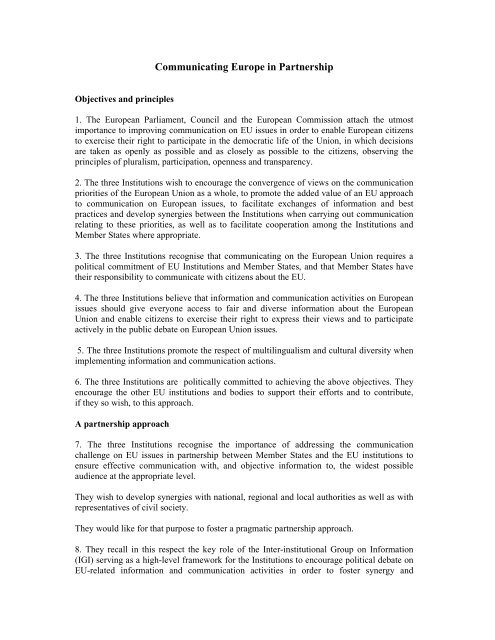Communicating Europe in Partnership - European Commission
Communicating Europe in Partnership - European Commission Communicating Europe in Partnership - European Commission
Communicating Europe in PartnershipObjectives and principles1. The European Parliament, Council and the European Commission attach the utmostimportance to improving communication on EU issues in order to enable European citizensto exercise their right to participate in the democratic life of the Union, in which decisionsare taken as openly as possible and as closely as possible to the citizens, observing theprinciples of pluralism, participation, openness and transparency.2. The three Institutions wish to encourage the convergence of views on the communicationpriorities of the European Union as a whole, to promote the added value of an EU approachto communication on European issues, to facilitate exchanges of information and bestpractices and develop synergies between the Institutions when carrying out communicationrelating to these priorities, as well as to facilitate cooperation among the Institutions andMember States where appropriate.3. The three Institutions recognise that communicating on the European Union requires apolitical commitment of EU Institutions and Member States, and that Member States havetheir responsibility to communicate with citizens about the EU.4. The three Institutions believe that information and communication activities on Europeanissues should give everyone access to fair and diverse information about the EuropeanUnion and enable citizens to exercise their right to express their views and to participateactively in the public debate on European Union issues.5. The three Institutions promote the respect of multilingualism and cultural diversity whenimplementing information and communication actions.6. The three Institutions are politically committed to achieving the above objectives. Theyencourage the other EU institutions and bodies to support their efforts and to contribute,if they so wish, to this approach.A partnership approach7. The three Institutions recognise the importance of addressing the communicationchallenge on EU issues in partnership between Member States and the EU institutions toensure effective communication with, and objective information to, the widest possibleaudience at the appropriate level.They wish to develop synergies with national, regional and local authorities as well as withrepresentatives of civil society.They would like for that purpose to foster a pragmatic partnership approach.8. They recall in this respect the key role of the Inter-institutional Group on Information(IGI) serving as a high-level framework for the Institutions to encourage political debate onEU-related information and communication activities in order to foster synergy and
<strong>Communicat<strong>in</strong>g</strong> <strong>Europe</strong> <strong>in</strong> <strong>Partnership</strong>Objectives and pr<strong>in</strong>ciples1. The <strong>Europe</strong>an Parliament, Council and the <strong>Europe</strong>an <strong>Commission</strong> attach the utmostimportance to improv<strong>in</strong>g communication on EU issues <strong>in</strong> order to enable <strong>Europe</strong>an citizensto exercise their right to participate <strong>in</strong> the democratic life of the Union, <strong>in</strong> which decisionsare taken as openly as possible and as closely as possible to the citizens, observ<strong>in</strong>g thepr<strong>in</strong>ciples of pluralism, participation, openness and transparency.2. The three Institutions wish to encourage the convergence of views on the communicationpriorities of the <strong>Europe</strong>an Union as a whole, to promote the added value of an EU approachto communication on <strong>Europe</strong>an issues, to facilitate exchanges of <strong>in</strong>formation and bestpractices and develop synergies between the Institutions when carry<strong>in</strong>g out communicationrelat<strong>in</strong>g to these priorities, as well as to facilitate cooperation among the Institutions andMember States where appropriate.3. The three Institutions recognise that communicat<strong>in</strong>g on the <strong>Europe</strong>an Union requires apolitical commitment of EU Institutions and Member States, and that Member States havetheir responsibility to communicate with citizens about the EU.4. The three Institutions believe that <strong>in</strong>formation and communication activities on <strong>Europe</strong>anissues should give everyone access to fair and diverse <strong>in</strong>formation about the <strong>Europe</strong>anUnion and enable citizens to exercise their right to express their views and to participateactively <strong>in</strong> the public debate on <strong>Europe</strong>an Union issues.5. The three Institutions promote the respect of multil<strong>in</strong>gualism and cultural diversity whenimplement<strong>in</strong>g <strong>in</strong>formation and communication actions.6. The three Institutions are politically committed to achiev<strong>in</strong>g the above objectives. Theyencourage the other EU <strong>in</strong>stitutions and bodies to support their efforts and to contribute,if they so wish, to this approach.A partnership approach7. The three Institutions recognise the importance of address<strong>in</strong>g the communicationchallenge on EU issues <strong>in</strong> partnership between Member States and the EU <strong>in</strong>stitutions toensure effective communication with, and objective <strong>in</strong>formation to, the widest possibleaudience at the appropriate level.They wish to develop synergies with national, regional and local authorities as well as withrepresentatives of civil society.They would like for that purpose to foster a pragmatic partnership approach.8. They recall <strong>in</strong> this respect the key role of the Inter-<strong>in</strong>stitutional Group on Information(IGI) serv<strong>in</strong>g as a high-level framework for the Institutions to encourage political debate onEU-related <strong>in</strong>formation and communication activities <strong>in</strong> order to foster synergy and
SPI(2008) 71complementarity. To that purpose, the IGI, co-chaired by representatives of the <strong>Europe</strong>anParliament, the Council and the <strong>Europe</strong>an <strong>Commission</strong>, and with the participation of theCommittee of the Regions and the <strong>Europe</strong>an Economic and Social Committee as observers,meets <strong>in</strong> pr<strong>in</strong>ciple twice a year.A framework for work<strong>in</strong>g togetherThe three Institutions <strong>in</strong>tend to cooperate on the follow<strong>in</strong>g basis:9. Whilst respect<strong>in</strong>g the <strong>in</strong>dividual responsibility of each EU <strong>in</strong>stitution and Member Statefor their own communication strategy and priorities, the three Institutions will, <strong>in</strong> theframework of the IGI, identify yearly a limited number of common communicationpriorities.10. These priorities will be based on communication priorities identified by the EUInstitutions and bodies follow<strong>in</strong>g their <strong>in</strong>ternal procedures and complement<strong>in</strong>g, whereappropriate, Member States' strategic views and efforts <strong>in</strong> this field, tak<strong>in</strong>g <strong>in</strong>to accountcitizens' expectations.11 The three Institutions and Member States will endeavour to promote appropriate supportfor communication on the priorities identified.12. The services responsible for communication <strong>in</strong> Member States and EU <strong>in</strong>stitutionsshould liaise with each other to ensure successful implementation of the commoncommunication priorities, as well as other activities l<strong>in</strong>ked to EU communication, if need beon the basis of appropriate adm<strong>in</strong>istrative arrangements.13. The Institutions and Member States are <strong>in</strong>vited to exchange <strong>in</strong>formation on other EUrelated communication activities, <strong>in</strong> particular on sectoral communication activitiesenvisaged by the Institutions and bodies, when they result <strong>in</strong> <strong>in</strong>formation campaigns <strong>in</strong>Member States.14. The <strong>Commission</strong> is <strong>in</strong>vited to report back at the beg<strong>in</strong>n<strong>in</strong>g of each year to the other EUInstitutions on the ma<strong>in</strong> achievements of the implementation of the common communicationpriorities of the previous year.15. This political declaration has been signed on [date].2



